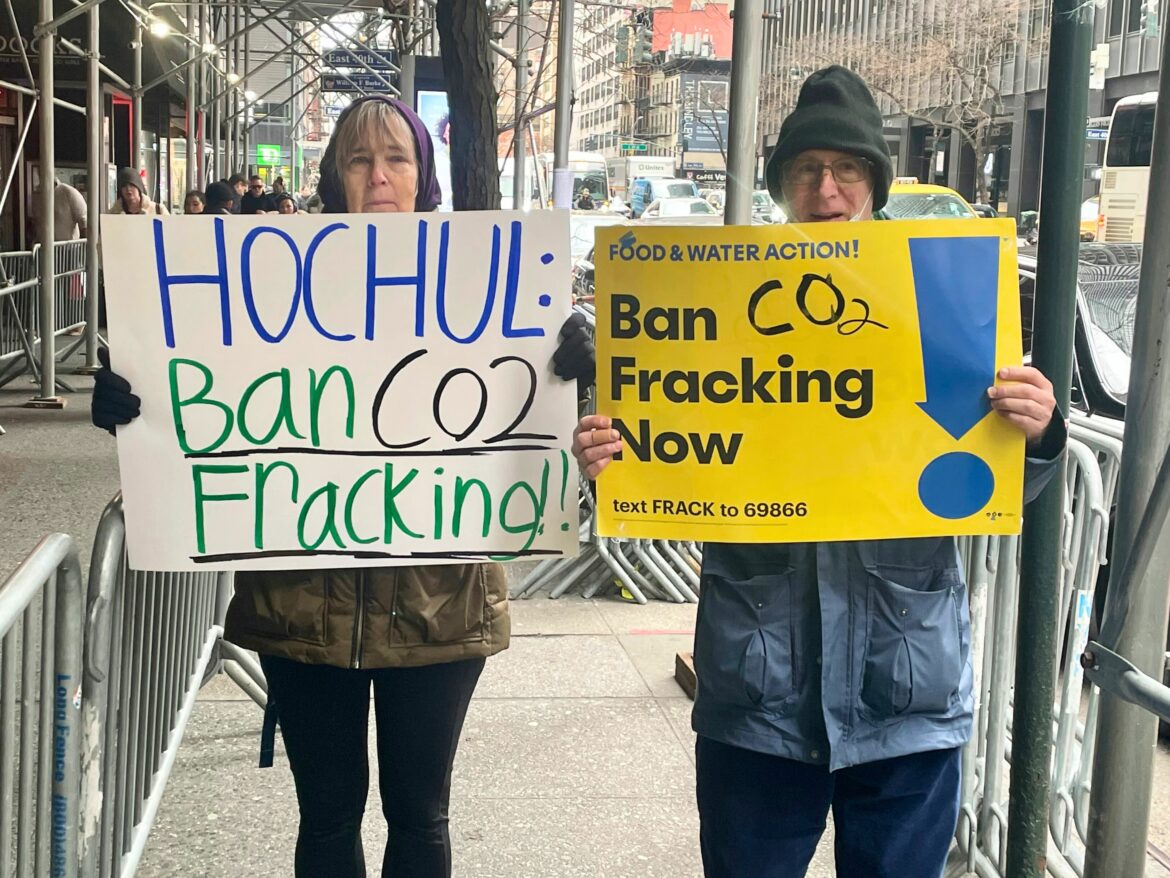During the final week of 2024, Gov. Kathy Hochul signed several long-awaited environmental bills into law: forcing polluters to pay for climate destruction, expanding the state’s fracking ban to prohibit a a new technique that uses carbon dioxide, and limiting new construction of schools within 500 feet of major highways.
Mariana Simões
Protestors hold signs outside Gov. Kathy Hochul’s office in January 2024, calling for CO2 fracking to be included in the state’s ban.
During the final week of 2024, Gov. Kathy Hochul signed several long-awaited environmental bills into law—forcing polluters to pay for climate destruction, expanding the state’s fracking ban to prohibit a a new technique that uses carbon dioxide, and halting construction of schools within 500 feet of major highways.
The first, dubbed the “Polluters Pay” or Climate Change Super Fund Act, will require the most prolific oil and gas producers that have business ties to New York pay $3 billion a year for the next 25 years, money that will be used to help bolster the state against the impact of climate destruction.
Federal lawmakers are pursuing a similar measure nationwide, while Vermont was the first state to adopt such a fund earlier this year.
“With nearly every record rainfall, heatwave, and coastal storm, New Yorkers are increasingly burdened with billions of dollars in health, safety, and environmental consequences due to polluters that have historically harmed our environment,” Hochul said in a statement Thursday accompanying the bill’s signing.
The legislation specifically targets companies that contributed more than 1 billion metric tons of global greenhouse gases between 2000 and 2018, fueling climate change-related weather like extreme heat and flash floods.
Such events cost New York taxpayers an estimated $2.2 billion in 2023, according to an analysis by the New York Public Interest Research Group (NYPIRG). That includes an estimated $309 million in New York City alone, NYPIRG found.
Kevin P. Coughlin / Office of Governor Kathy Hochul
Gov. Kathy Hochul touring storm damage in upper Manhattan after Hurricane Ida in 2021.
The money paid into the Climate Change Super Fund, $75 billion in total, will be used to pay for infrastructure adaptation projects to mitigate the impact of weather disasters. That’s expected to include drainage upgrades, energy-efficient cooling systems, new parks and green roofs as well as public health programs, according to the Energy Justice Law & Policy Center.
At least 35 percent of the funds must go towards projects in “Disadvantaged Communities”—neighborhoods disproportionately impacted by climate and environmental burdens.
“We cannot continue allowing fossil fuel companies to reap massive profits while sticking the public, especially frontline communities, with the bill for more frequent and intense storms, floods, heat waves and other climate disasters,” Raya Salter, the Center’s executive director, said in a statement Thursday.
The State Department of Environmental Conservation (DEC) is tasked with identifying the companies impacted by the new law and creating a plan to spend the funds and track compliance. It will need to hold at last two hearings to garner public input on the rules. The Attorney General’s Office will be in charge of enforcing compliance.
Advocates expect push back from the companies forced to pay up. The American Petroleum Institute (API), a trade association for the oil and natural gas industry, previously criticized the bill as “harsh and oppressive,” and described it as an attempt to hold certain companies “responsible for the actions of society at large.” In testimony on Vermont’s version of the legislation this past spring, API questioned its constitutionality.
But supporters say they’ll defend the law against anticipated legal challenges.
“This legislation is about fairness, responsibility, and protecting the future for generations to come,” Assemblyman Jeffrey Dinowitz, who sponsored the bill alongside State Sen. Liz Krueger, said in a statement Thursday.
Closing the ‘loophole’ in New York’s fracking ban
Hochul also added her signature this week to S.8357/A.8866, which expands New York State’s decade-old ban on fracking to include a new technique that uses carbon dioxide (CO2) instead of water to extract gas from below-ground.
Environmental advocates have slammed CO2 fracking as a potential “loophole” to bring the controversial drilling practice to New York. The state was the first in the country with known gas reserves to prohibit natural gas fracking, after a 2014 study determined “the risks substantially outweigh any potential economic benefits,” then-DEC Commissioner Joe Martens said at the time.
Richard Schrader, New York government affairs director at NRDC (Natural Resources Defense Council), said expanding the ban to explicitly outlaw CO2 fracking is “common sense.”
“New York State should not be a testing ground for drilling and fracking using carbon dioxide,” Schrader said in a statement. “It’s a very uncertain technology that has caused serious problems.”
Building new schools away from highways
Among the other end-of-year bills signed by the governor: the Students Impacted by Gross Highways, or SIGH Act, which prohibits the construction of schools within 500 feet of major roadways.
Adi Talwar
The triple cantilever section of the Brooklyn Queens Expressway in Brooklyn Heights.
New York has more students in schools that fit this criteria than any other state in the country, according to the New York Civil Liberties Union (NYCLU), which co-wrote the legislation. This includes more than 250 schools near highways just in New York City, the majority of which serve predominately students of color.
“Today, New York took an enormous step towards dismantling the unjust system of environmental racism,” NYCLU’s Donna Lieberman said in a statement earlier this week. “School should be a place where kids learn and thrive, not a danger zone where they breathe toxic air.”
To reach the editor, contact Jeanmarie@citylimits.org
Want to republish this story? Find City Limits’ reprint policy here.
The post Gov. Hochul Signs Bills to Ban CO2 Fracking, Make Polluters Pay for Climate Damage appeared first on City Limits.

